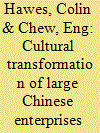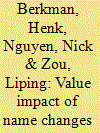|
|
|
Sort Order |
|
|
|
Items / Page
|
|
|
|
|
|
|
| Srl | Item |
| 1 |
ID:
102719


|
|
|
|
|
| Publication |
2011.
|
| Summary/Abstract |
The Chinese government has recently introduced a policy requiring all large Chinese business corporations to transform their corporate cultures with the aim of increasing their competitiveness on the international stage. This paper traces the origins of the policy to the outstanding performance of a small number of Chinese firms since the late 1980s, a phenomenon attributed by the CEOs of these firms to effective implementation of cultural values change among their workforces. We give detailed accounts of two such firms, Haier Group and Huawei Technologies, demonstrating how they have utilized cultural management techniques to improve their employees' performance. We also identify some negative aspects of their approach to cultural management that may impede these firms in their efforts to become truly international corporations.
|
|
|
|
|
|
|
|
|
|
|
|
|
|
|
|
| 2 |
ID:
102718


|
|
|
|
|
| Publication |
2011.
|
| Summary/Abstract |
Are the internationalization strategies of China's private businesses different from those of state-owned businesses? To date, little systematic empirical research addresses this question, despite the now well-established arguments that market and institutional imperfections influence the outward foreign direct investment (ODI) of China's state sector MNEs. Why is so little known about private sector foreign direct investment? One important reason is that private companies have gone to considerable lengths to conceal their activities by using offshore holding companies in tax havens. This paper, using a sample of offshore listed companies that are privately controlled, investigates what we dub 'onward-journeying' - foreign direct investment undertaken via tax havens. In doing so it further explores the ODI strategies of some of China's most successful private companies.
|
|
|
|
|
|
|
|
|
|
|
|
|
|
|
|
| 3 |
ID:
102714


|
|
|
| 4 |
ID:
102716


|
|
|
|
|
| Publication |
2011.
|
| Summary/Abstract |
We empirically investigate the factors that drive the uneven regional distribution of foreign direct investment (FDI) across Chinese provinces from 1995 to 2006. We first perform a factor analysis to summarize information embodied in around 40 variables and derive four FDI determinants: 'institutional quality', 'labour costs', 'market size', and 'geography'. Applying these estimated factors, we then employ instrumental variable (IV) estimation to account for endogeneity. In line with theoretical predictions, we find that foreign firms invest in provinces with good institutions, low labour costs, and large market size. The Arellano-Bond dynamic panel generalised method of moments (GMM) results show strong agglomeration effects that multinationals tend to invest in provinces which attract other foreign firms, consistent with the economic geography literature. Several robustness tests indicate that low labour costs combined with improvements in institutions are the key for attracting FDI in China.
|
|
|
|
|
|
|
|
|
|
|
|
|
|
|
|
| 5 |
ID:
102721


|
|
|
|
|
| Publication |
2011.
|
| Summary/Abstract |
For a sample of US stocks in the period 1998-1999, Cooper, Dimitrov, and Rau (2001) report dramatic value increases in the 10 days around the announcement of dotcom name changes. We find much smaller value changes for a sample of Chinese listed firms with changes to internet-related dotcom names for the 1998 to 2002 period. This result is surprising given the high proportion of retail trading in China and the prohibition to short sell Chinese stocks. Also in contrast to Cooper, Dimitrov, and Rau (2001), we find that most of the value increase for our sample firms is realized gradually prior to the announcement. Further investigation reveals that our sample firms experience more frequent CEO-turnover, significant increase in return-on-assets, and involve more restructure activities around the name change event. These results suggest that the value increases for firms with name changes are the consequence of substantial and successful operational changes, and that the name change is simply part of that process, instead of the cosmetic effects of name change or investor mania suggested by previous studies.
|
|
|
|
|
|
|
|
|
|
|
|
|
|
|
|
|
|
|
|
|